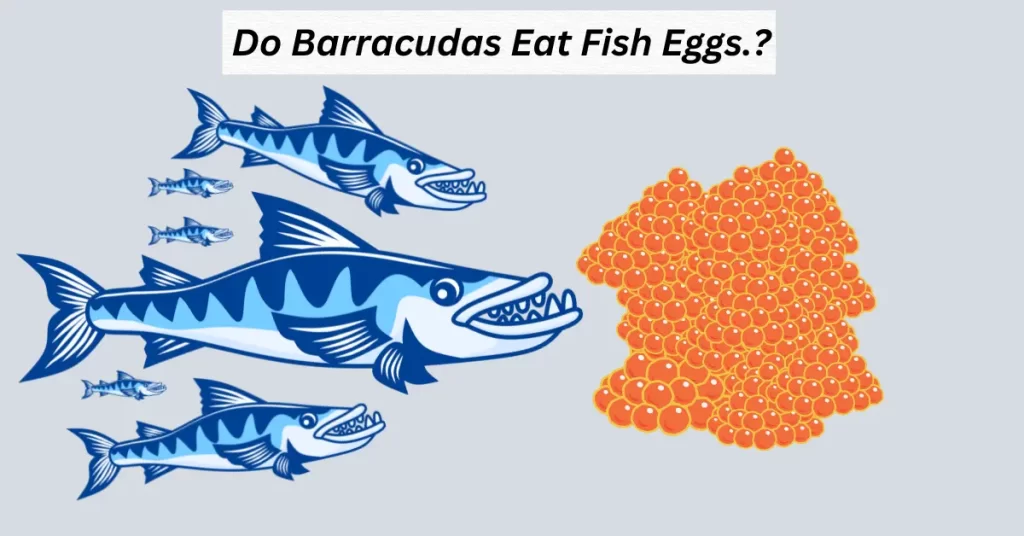Barracudas are fearsome hunters that inhabit tropical and subtropical waters all over the world. Their razor sharp teeth, incredible speed and versatile hunting abilities allow them to prey on a wide variety of creatures from fish to squid. However, it begs the question do these powerful predators also have an appetite for fish eggs?
Fish eggs are a critical component of marine ecosystems providing sustenance to a host of sea creatures such as fish sharks and even some whales. They also play a crucial role in the survival and reproduction of fish populations as they serve as the foundation for new generations of Aquatic life. Despite their significance fish eggs are vulnerable to predation with a number of animals including certain fish turtles and birds, targeting them for food. Given the barracuda’s opportunistic feeding habits it is worth exploring whether they specifically seek out and consume fish eggs.
Studying Barracudas’ Impact on Fish Egg Survival
Recent studies have shed light on the feeding habits of barracudas and their Potential Impact on the marine ecosystem. In a study published in the Marine Ecology Progress Series journal, researchers observed barracudas feeding on anchovy eggs in the Mediterranean Sea. The study found that barracudas selectively target dense aggregations of anchovy eggs demonstrating their ability to locate and consume fish eggs with precision.
Another Study published in the Ecology journal found that Barracudas in the Florida Keys also consume the eggs of several species of reef fish including grunts, snappers and parrotfish. The researchers noted that the barracudas were not indiscriminate feeders but rather actively sought out and targeted the egg specifically.
Found that warmer ocean temperatures are affecting the timing of fish spawning, potentially reducing the availability of fish eggs as a food source for barracudas. This could have ripple effects throughout the food chain as other marine species may also rely on fish eggs for nutrition.
Reason They Feast on Fish Eggs
Barracudas are known to feed on a variety of prey including fish eggs. But why do they choose to eat fish eggs?
Easy Source
One possibility is that fish eggs are simply an easy food source as they are often found in dense aggregations making them an easy target for predators.
Nutritious Meals
Another reason could be the unique nutritional benefits that fish eggs provide containing protein and essential nutrients that aid in growth and reproduction.
But barracudas Are not the only creatures that eat fish eggs. Starfish and other fish species also prey on fish eggs. Therefore the consumption of fish eggs by barracudas can have implications for the wider marine ecosystem.
Understanding why barracudas eat fish eggs is important, climate change is affecting the availability of fish eggs as a food source. As ocean temperatures rise barracudas are expanding their range and potentially altering the marine food chain. Further research is needed to fully comprehend the impacts of barracuda feeding habits on the marine ecosystem.
The Role of Fish Eggs in the Marine Food Web
Barracudas are known to feed on fish eggs and their consumption of large numbers of eggs could have negative consequences for the reproductive success of the fish population. This could impact the abundance and diversity of other species in the ecosystem that rely on these fish as prey.
Effective conservation and management strategies are needed to ensure the health and sustainability of marine ecosystems. The potential impact of barracuda predation on fish eggs also has implications for fisheries management as many species of reef fish targeted for commercial and recreational fishing rely on their eggs for reproductive success. Understanding the feeding habits and ecology of these predators is crucial for managing these fisheries sustainably.
Selective Consumers of Fish Eggs
Barracudas are formidable predators in the marine ecosystem known for their sharp teeth and lightning fast strikes. While they are known to prefer fish eggs as a food source they are also opportunistic feeders consuming a variety of other prey such as small fish crustaceans and cephalopods. This flexible feeding behavior allows them to adapt to changes in their environment and ensures their survival even when certain prey populations are scarce.
However, despite their predatory prowess barracudas are not invincible. They are vulnerable to predation themselves with larger fish, sharks and marine mammals preying on them. This highlights the Importance of understanding the Ecological role of barracudas and their position in the Marine food web.
Conclusion
As Global warming continues to impact ocean temperatures and fish spawning patterns it will be crucial to monitor the impacts on barracuda feeding habits and their role in the marine food web. Effective conservation and management strategies will also be necessary to ensure the health and sustainability of Marine ecosystems including those that rely on the productivity and sustainability of Commercial and recreational fisheries.

